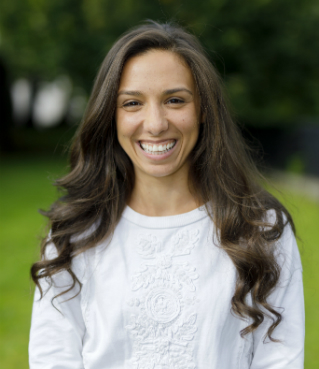A person’s confidence in their own ability varies significantly depending on who is in their team, according to new research from the University of Stirling.
The new study found that self-confidence in athletes, who are highly dependent on a teammate, fluctuates depending on the person they are working with.

Dr Christine Habeeb led the research which found a person's confidence in their own ability can vary significantly depending on who is in their team.
Researchers believe the findings could be key in analysing team dynamics and translate into work environments where teamwork is vital, such as the military, police and health sectors.
Christine Habeeb, of the Faculty of Health Sciences and Sport, who led the work, said: “Standard, widely held theories typically suggest self-confidence is based on our own ability.
“However, our study indicates that our perception of confidence – in our own ability, or that of a teammate – is actually based on the role we play and those we are working with.”
The research analysed the performance of elite competitive cheerleaders – 51 men and 51 women - in the United States. Each participant worked in male-female pairs, carrying out 12 acrobatic performances with three different partners.
For each routine, the man threw his female counterpart in the air – meaning she was highly dependent on him, while he was less dependent on her.
Before each performance, participants were asked to rate the confidence they had in their own ability, that of their teammate and the pairing overall. Each performance was scored independently by researchers and then rated by each participant.
The study concluded that sources of confidence differ depending on someone’s role in a team and the people they are working with. The more dependent a person was on someone else to perform in the group, the more their confidence depended on that person, the research found.
In the case of the highly dependent participants (the women), their confidence in their own ability, and that of their teammate and the pairing overall, changed ahead of each performance depending on their partner. The level of their own performance also changed.
In other words, they generally based their perception of their own ability, that of their teammates and the team overall on the person they were performing with.
In contrast, the confidence of the less dependent participants (the men) in themselves, their teammates and the group overall, remained stable and relative to their own ability, regardless of their partner. They rated others based on their own abilities.
The patterns were more apparent in the more difficult tasks.
Wider audience
Dr Habeeb said: “For men, regardless of the women’s ability, their performance remained stable and relative to their own ability.
“However, for the women, their scores changed with each partner. We witnessed their self-confidence change depending on their partner – and that was interesting. Their perceptions after the task also differed accordingly.
“This is important because many of us work in teams where we are dependent on others and, unknowingly, our perceptions of ourselves might be based on how others perform, instead of our own performance abilities.
“Another way to look at it is; our perceptions of others’ abilities may actually be a reflection of how we think about our own abilities.”
She added: “This updates our current understanding of how confidence emerges within groups and could have an effect on a much wider audience, such as military, police, and health sectors where there are hierarchies and persons of both low and high dependence.”
Dr Habeeb collaborated with Dr Pete Coffee, senior lecturer in Health Sciences and Sport, and Professor Robert Eklund, Associate Dean for Faculty Development at Florida State University.
The study, It depends on the partner: Person-related sources of efficacy beliefs and performance for athlete pairs, is published in the Journal of Sport & Exercise Psychology.
Dr Habeeb is currently carrying out a second study to further investigate group dynamics, this time focusing on teams of four, all-female cheerleaders.
Background information
Media enquiries to Greg Christison, Communications Officer, on 01786 466 687 or greg.christison@stir.ac.uk
